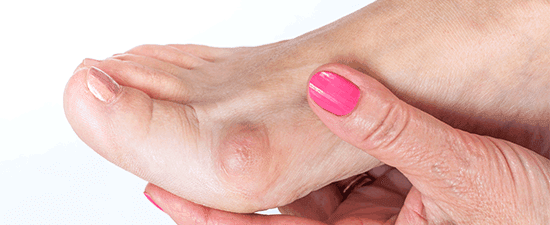- Home
- Foot & Ankle Conditions
- Morton's Neuroma
Morton's Neuroma: causes, symptoms and treatments
What is Morton's neuroma?
A neuroma is a benign growth that involves thickening and inflammation of nerve tissue that results in pain or a burning sensation. A Morton's neuroma is found in the tissue of the toes.
The thickening of the nerve that characterizes a neuroma is often the result of compression and irritation. This compression not only enlarges the nerve but can also lead to more severe symptoms and potentially permanent nerve damage if not addressed.
Symptoms of Morton’s neuroma include pain in the ball of the foot, feeling like you’re standing on a pebble, burning pain, foot pain or numbness.
- What are common causes of Morton's neuroma?
- What are common risk factors for Morton's neuroma?
- How is Morton's neuroma diagnosed?
- Nonsurgical treatments for Morton's neuroma
- Advanced Morton's neuroma treatment options
- Why UFAI is the best choice for Morton's neuroma care?
- Morton's neuroma FAQs
- What kind of doctor treats Morton's neuroma?
- Can Morton's neuroma cause leg or calf pain?
- What are the best shoes to wear for Morton's neuroma?
- What does Morton's neuroma look like?
- Can Morton neuroma cause sciatica?
- Can Morton's neuroma cause numb toes?
- Can Morton's neuroma come back?
- Can an X-ray show Morton's neuroma?
- What can be mistaken for Morton's neuroma?
-
Foot and Ankle Surgeon and Director of University Foot and Ankle Institute
Dr. Bob Baravaria DPM, FACFAS is a Board-Certified Podiatric Foot and Ankle Specialist. He is an assistant clinical professor at the UCLA School of Medicine and serves as Director of University Foot and Ankle Institute.
Dr. Baravarian has been involved in athletics his entire life and played competitive tennis in high school and college. He has an interest in sports medicine, arthritis therapy, and trauma/reconstructive surgery of the foot and ankle. He is also fluent in five languages (English, French, Spanish, Farsi, and Hebrew),
Learn More from our Morton's Neuroma Blog Articles
 Great service, start to finish. Although I hope to not take my son back and glad I found UFAI and he got the attention he neede...Carey E.
Great service, start to finish. Although I hope to not take my son back and glad I found UFAI and he got the attention he neede...Carey E. I really like the doctor’s conservative approach, carefully getting to the core of my problem and referring neuro and mri appoi...Glen B.
I really like the doctor’s conservative approach, carefully getting to the core of my problem and referring neuro and mri appoi...Glen B. Overall, it was a great experience. I've been coming to Dr. Kellman for about a year and he and his staff are very helpful.Vanessa W.
Overall, it was a great experience. I've been coming to Dr. Kellman for about a year and he and his staff are very helpful.Vanessa W. ExcellentDebasish M.
ExcellentDebasish M. Everyone was friendly and professional.Victor L.
Everyone was friendly and professional.Victor L. Very efficient and an excellent serviceHorwitz J.
Very efficient and an excellent serviceHorwitz J. Chaos in the office checkin. We weren’t forewarned about the iPad data collection. That made me late for a following appointmen...Carl C.
Chaos in the office checkin. We weren’t forewarned about the iPad data collection. That made me late for a following appointmen...Carl C. Dr Nalbandian is an exceptional doctor and person. The staff respectfully & compently delt with an issue I had regarding a prev...Karen M.
Dr Nalbandian is an exceptional doctor and person. The staff respectfully & compently delt with an issue I had regarding a prev...Karen M. Visiting the office is a pleasurable occurance.Thomas J.
Visiting the office is a pleasurable occurance.Thomas J. I found UFAI after failing traditional treatment for plantar fasciitis in our small town. I did everything suggested, to no ava...Holly B.
I found UFAI after failing traditional treatment for plantar fasciitis in our small town. I did everything suggested, to no ava...Holly B. Dr Kelman and his staff are always wonderfully caring and respectful to my father who has Alzheimer's dementia.Erland E.
Dr Kelman and his staff are always wonderfully caring and respectful to my father who has Alzheimer's dementia.Erland E. Thank you for being there for your patients.Dieter B.
Thank you for being there for your patients.Dieter B.

